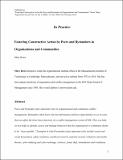| dc.contributor.author | Rowe, Mary | |
| dc.date.accessioned | 2025-07-08T04:18:06Z | |
| dc.date.available | 2025-07-08T04:18:06Z | |
| dc.date.issued | 2018-04 | |
| dc.identifier.uri | https://hdl.handle.net/1721.1/159970 | |
| dc.description | Note: Table One in this article is a long list of “Some Naturally Occurring Helpful Bystander Actions.” This list illustrates the importance of frequent, mundane bystander actions in building community and a culture of conflict management competence, as well as the better-known decisive actions that bystanders can take in emergency situations. | en_US |
| dc.language.iso | en_US | en_US |
| dc.publisher | Negotiation Journal | en_US |
| dc.subject | conflict management systems, bystanders, peers, harassment, workplace safety, school safety, bystander effect, organizational ombudsman, management training | en_US |
| dc.title | Fostering Constructive Action by Peers and Bystanders in Organizations and Communities | en_US |
| dc.type | Preprint | en_US |
| dc.identifier.citation | Mary Rowe, “Fostering Constructive Action by Peers and Bystanders in Organizations and Communities,” Negotiation Journal Vol. 34, No. 2 (April 2018): 137-163. | en_US |
